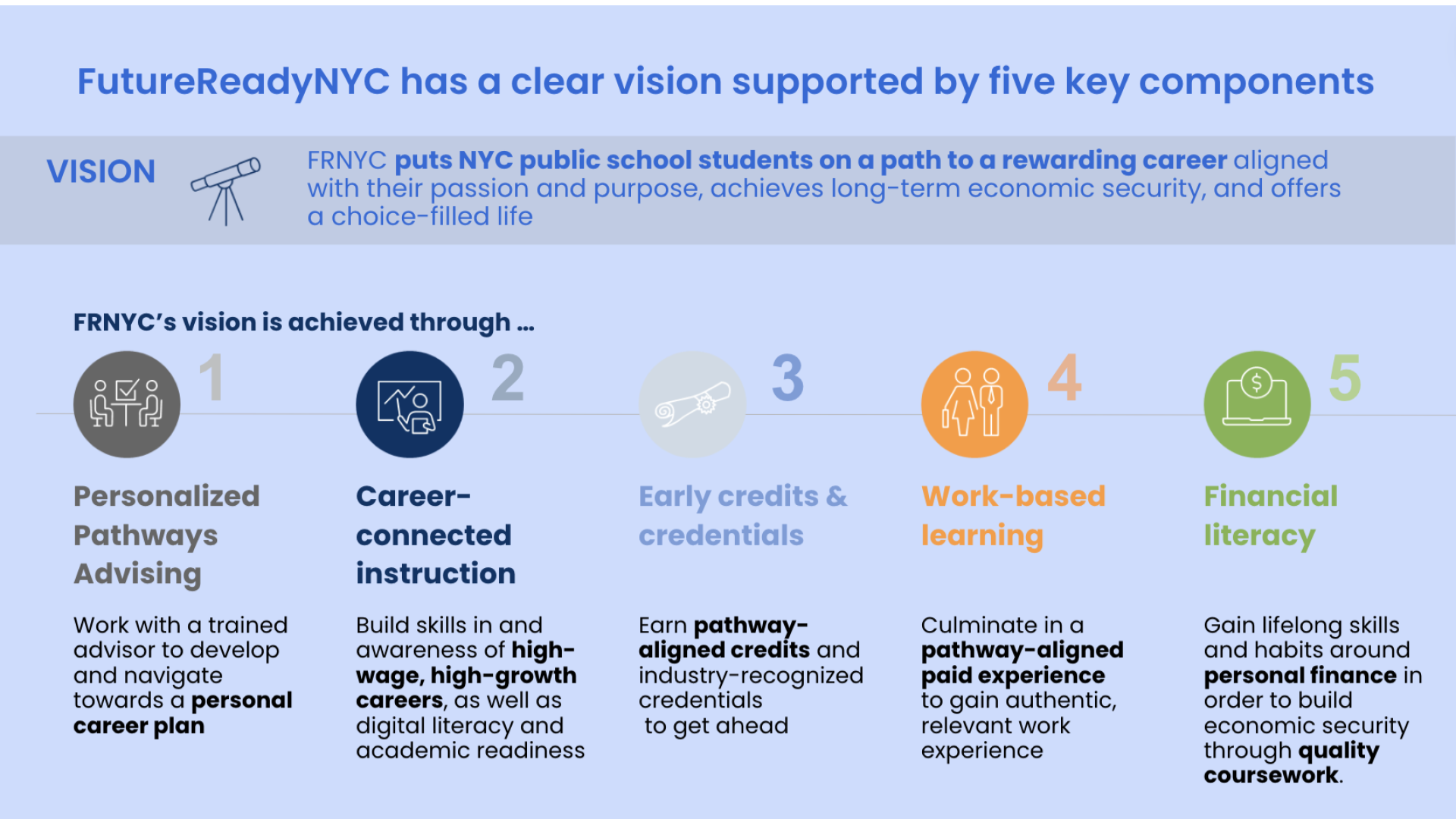Featured Work: Designing and Scaling High-Quality College and Career Pathways in New York City
The nation’s largest school district—New York City Public Schools (NYCPS)—is investing deeply in driving economic and social mobility by putting students on a clear path to high-value career fields.
Launched as part of Mayor Adams’ efforts to connect more New Yorkers with quality jobs, FutureReadyNYC (FRNYC) aims to transform high schools into centers of career connected learning. The initiative seeks to ensure that every student graduates with demand-driven knowledge and skills, armed with a plan for their future, and on a path to in-demand career roles that pay living wages. Cross-sector partnerships are key to this work and are evident through NYCPS collaborations with The City University of New York (CUNY), employers, work-based learning intermediary organizations, and myriad other partners.
 To reach this vision, FRNYC leverages five core components integral to designing and delivering quality, demand-driven pathways:
To reach this vision, FRNYC leverages five core components integral to designing and delivering quality, demand-driven pathways:
- Personalized Advising
- Career-Connected Instruction
- Early College Credits and Credentials
- Work-Based Learning
- Financial Literacy
Since the work started in the summer of 2022, Education Strategy Group (ESG) has served as a lead partner with three primary roles pivotal to the long-term success of the initiative. Within the first year, we helped build the essential pieces of NYCPS’s career-connected system of learning to stand up quality pathways. ESG conducted a labor market analysis to both identify which occupational fields within IT, healthcare, education, and business were projected to be in demand and pay a living wage, as well as identify the knowledge, skills, abilities, and credentials that employers within and across those fields were looking for in that future workforce.
Using the results of the market analysis, ESG helped NYCPS develop sequences of courses and corresponding standards—aligned with those qualities employers were seeking—for each of 10 FRNYC pathways, including designated connection points for a range of work-based learning experiences, early college course taking through CUNY, and credential of value attainment.
To help schools pivot from theory and planning into practice, ESG designed and facilitated a Community of Practice (CoP), starting with year one implementation schools, to bring together key school team members around a shared vision for FRNYC success and build a foundational understanding of the ways in which FRNYC’s five core components must work together. The CoP for FRNYC operated as an important vehicle for disseminating information to all school teams, providing direct support and technical assistance, and continuing to build the knowledge base of school teams while cultivating their identity as core members of a connected and growing network. Our bi-monthly series of in-person CoP convenings as well as two summer institutes to prepare school-based teams to implement their FRNYC action plans have been a cornerstone of FRNYC’s early success.
In addition, ESG led the design and delivery of individualized coaching within the 100 year one high schools to support early implementation efforts. Coaching focused on helping each participating school develop implementation plans; identify target milestones; examine early progress; determine course correction strategies; and build capacity for the delivery of career-connected learning. Our work included partnering with local Community-Based Organizations (CBOs) with relevant expertise and strong school-based relationships to help deliver that coaching, including Pencil, NAF, Urban Assembly, ExpandEd, Eskolta, Internationals Network, and Bank Street College of Education.
As we moved into the second year of the initiative, NYCPS and ESG recognized that deeper development was needed in a few key areas in order for educators to successfully integrate the five core components into the day-to-day activities of the schools. FRNYC schools needed deeper resource and strategy development in advising—a roadmap, so to speak—to help students navigate their educational path, explore career options, and make informed decisions about their future. We developed a draft career navigation framework to align the key aims of FRNYC with developmental advising milestones for each band of high school, and we also designed activities to help students reach those milestones, thereby making informed decisions about their postsecondary interests.
But we also pushed in a second major direction in year two to provide a stronger accelerated path for FRNYC students. In partnership with NYCPS, we worked closely with faculty across CUNY campuses to build out occupationally-specific, content-aligned CollegeNow courses to be offered across FRNYC pathways as high-quality early postsecondary opportunities to accelerate students’ path to a postsecondary credential with labor market currency. That work is ongoing with a goal of making such coursework available to students starting in the 2024-2025 school year. As a third cohort of approximately 30 schools joins FRNYC, and as the original FRNYC schools move into deeper implementation, the focus of our partnership with NYCPS is necessarily shifting. The early momentum within FRNYC allows NYCPS to now expand its focus from planning for and supporting early implementation to scaling and sustaining high-quality implementation to ultimately reach its north star goal. ESG remains committed to supporting this transition through direct implementation assistance, further content development, and strategic capacity building initiatives aimed at key stakeholders within NYCPS.



